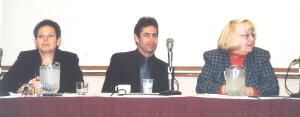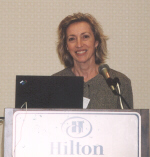The Technical and Management Changes in ILLPresentation to the Health Sciences OCLC Users Group MeetingTony Melvyn, OCLC; Susan P. Lieberthal, Countway Library of Medicine, Harvard Medical School and Dena Plaisted, University of Arkansas for Medical Sciences New Orleans, La. - October 28, 2001
http://purl.oclc.org/corc/system/Pathfinder/2562:xid=LTM Survive, Thrive or The Many Faces of ILLiad From an installation viewpoint she felt the manuals were useless, having
no indexes. Atlas, the company actually marketing the software, was
unable to install remotely due to the campus firewalls. The installer
who came was also the instructor and the extra $1200 required for installation
only covers 8 hours of instruction/installation combined. She felt they
needed instruction, but in hindsight, could have spent more time with
the installation. She feels that any experienced ILL staff members could
easily pick up the necessary skills for ILLiad by using the system. Stumbling blocks: The manuals - whoever authored these did not know DOCLINE. She felt they were too technical and skipped some vital steps. Dena felt like installing ILLiad was like bringing up a mini-integrated library system. Make your system support people aware of the requirements on their time for installation. UAMS installed a dedicated terminal in place of ILL forms, so when users wanted to place a request in-house, they simply sat and entered the data. This helped with the transition process, but patrons do like the new paperless system. Other running comments from Dena's experience included: If patron requests something the library already owns, you can decline the request electronically and give location information. There is one system for everything, the request is legible, patron information is correct. Accept no paper requests! Updating is fast (data transferred into DOCLINE and OCLC). Statistics are compiled as we do the work. Workload is reduced. There was a savings in paper, toner, staff and equipment. Staff levels have been reduced by 2 people. ILLiad The patron is empowered and self-sufficient. They must register initially, and create their own log-in code. The ILL department then checks for completeness and accuracy of newly registered patrons before proceeding with the request. However, patrons can logon from their desktop and continually check the status of their own request. Email notifications are sent automatically. Labels and invoices can be generated. The system is compatible with ARIEL and OCLC. Pricing: There is both member and non-member pricing. There is an annual license fee based on the number of ILL "borrows". There is a separate charge for installation and customization is available from the installer: Atlas Systems. Around Christmas, 2001, Odyssey will be released as a new document delivery component of the ILLiad system. He gave the Virginia Tech library as an example of a library that puts their ILLiad statistics up online. These may be viewed at the following address:
Any library, information center, institution or organization that borrows or lends biomedical or healthcare information meet the needs of health professionals is eligible to participate. Other applications will be considered on a case by case basis. All participants establish a deposit account and use EFTS for credits and debits against their account. Libraries that are net borrowers must keep an account balance by sending a check to their region EFTS coordinator. EFTS Transaction Files are uploaded to the region accounting office at the end of each month and a monthly EFTS Transaction Statement is sent to each participating library. Among the advantages are: monthly detailed transaction reports; ability to handle differential charges such as additional rush or fax charges; ability to vary charges to members of special groups; ability to handle non-DOCLINE transactions; ability to handle credits. [Ed. note, for more information open their website at: http://nnlmner.uchc.edu/efts/ ] History of EFTS EFTS originated in 1996 with Region 8, the New England states. It was a collaborative project involving NN/LM New England Region 8, University of Connecticut Health Center, and Jay Daly of QuickDOC. Region 1, or the Middle Atlantic Region, which includes New York, New Jersey, Pennsylvania and Delaware, joined EFTS in 1998. Region 5, the south Central Region, including Texas, Arkansas, New Mexico, Oklahoma and Louisiana began using EFTS in 1999. Future enhancements will include a new SQL server to process the increasing number of transactions and add more functionality to the system, online monthly statements and web-based data collection. Susan Lieberthal, Countway Library of Medicine, Harvard Medical School, is an avid ILLiad supporter. Presently Harvard is only using ILLiad for lending. They use the EFTS system for billing and find that the two systems work well together. They incorporate three different billing systems at Harvard: IFM (the OCLC billing component), EFTS, and AR (Harvard's accounts receivable). This required some tweaking of the system, but has proven to work fine. She explained that IFM billing is taken care of entirely by OCLC. This is ideal. Close to ideal is the EFTS system, which requires building a text file, and sending the FTP file to University of Connecticut every month. The AR system is not ideal at all, since it costs about $11.00 to generate each invoice. It would be useful to build a file in ILLiad to be compatible with AR. Countway's efforts to limit billing Customer database in ILLiad: Susan commented on the importance of maintaining your customer database to make sure your filled requests are being accounted for. Sometimes mistakes are made while changing a non-EFTS customer to an EFTS customer. ILLiad enhancements: ILLiad can now modify EFTS charges and give EFTS credits. However, ILLiad cannot create an ILL number automatically in response to manual input of phoned/faxed requests. In conclusion: ILLiad/Atlas Systems is committed to serving DOCLINE ILL departments. Susan suggests that it is time to take EFTS national. She asked, "Can EFTS emulate IFM?" and said that "IFM and EFTS transaction fees are the best bargain in the library world today!"
|
 An
informative and informal presentation was presented on the ILLiad system
from OCLC for performing, tracking and gathering information for Interlibrary
Loan functions. The newest aspect of ILLiad is that it will now work
with DOCLINE and EFTS, which is of extreme importance to medical librarians.
An
informative and informal presentation was presented on the ILLiad system
from OCLC for performing, tracking and gathering information for Interlibrary
Loan functions. The newest aspect of ILLiad is that it will now work
with DOCLINE and EFTS, which is of extreme importance to medical librarians.